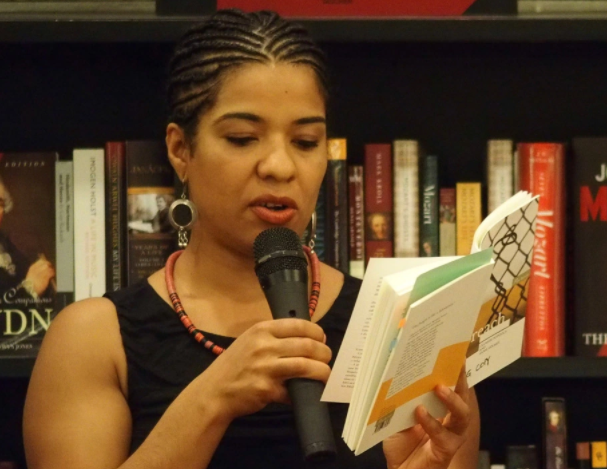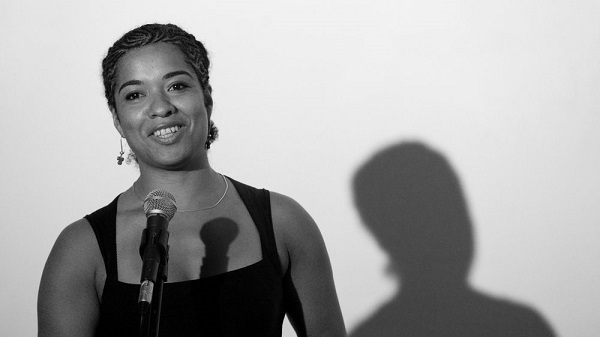Although she’s been active in the literary world for a few years, Olumide Popoola caught the attention of the mainstream audience in July 2017 when she released her fictional novel ‘When We Speak of Nothing’.
Thenceforth, Popoola, a Nigerian-German author and poet, became “a powerful new voice”.
The book, whose setting is London and Niger Delta, revolves around the lives of two male friends, one who’s queer — and the acceptance of LGBT people in the UK and Nigeria.
Popoola has published a novella (This Is Not About Sadness), a play (Also by Mail) and a short story collection (Breach) which she co-authored with Annie Holmes.
TheCable Lifestyle recently posed some questions at her about what it means to be a writer, her Nigerian roots, creative process and the objective of ‘When We Speak of Nothing’ — and this was what she had to say.
What was your childhood like?
I started travelling when I was one year old. I was born in Germany but moved to Nigeria. I have an old Nigerian passport from when I was around 3 and it is full of entry stamps to Ghana, Germany and other places. I think these early years marked me and I have kept the travelling bug ever since.
What influenced your choice of career?
I always wanted to be a writer, from the moment I learned writing. I expressed this as early as six years old. I started performing as a spoken word artist at age 19, prose came later. It all comes, I think, from an active imagination, the escape a good story offers, the other lives you can experience. I was a ferocious reader as soon as I could read on my own.
What do you enjoy the most about writing?
The breathless excitement I have when all comes together. It is similar to when I finish reading a good novel. I want to speed ahead and at the same time it all coming together is so sweet that I need to savour it and slow down (but am hardly able to). It is the same for me when writing, when all falls into place and the story has revealed itself to me, or shown why I wanted to tell it. I don’t always know that in the beginning or while writing. I know emotionally where I want to go but often I cannot articulate that or put my finger on it straight away. It’s a very satisfying and exciting feeling, when it becomes a living thing that makes sense and has a sort of resolution at the end.
Tell us about creative process
Sometimes I have to write around the topic or theme (or feeling as described above) to find out what I want to do with the piece. This automatic writing unearthes the direction, or simply more concrete details. For prose I often do a lot of research, textual and face to face, but also trying to inhabit the character.
I went to theatre school for a year and one of the earliest exercises we did was building up a character from their walk. This has been invaluable to me when writing. Trying out how to fit into someone else’s shoes, literally. Taking them for a walk around the block, finding out what they see and how, how people react to them.
I’m not a writer who sits every day at the same time. I work best in intense bursts, and do a lot of work away from the desk, trying things out in my mind, letting things marinate.
Have you been able to connect with your Nigerian roots?
I have been coming to Nigeria since I was a one year old, some times more regularly than others. I have lived in the country for a number of years. I still try to go every few of years. London is of course full of Nigerian and hyphenated Nigerian culture (Nigerian-British, or as in my case Nigerian-German and a little British now).
It is easy to be immersed in the diasporic side of the culture. I try to keep informed of what is happening literature-wise. But I also like the music, old-school and current.

What’s your favourite Nigerian meal?
Amala and Egusi.
How do you feel about stereotypes?
They restrict our lives incredibly. Imagine how we much we could grow, how free we could be if there weren’t boxes everywhere that we are squeezed into.
What’s your opinion about the Nigerian woman?
I am not sure if there is THE Nigerian woman, especially not right after a question about stereotypes… But generally the women I have met throughout my life have been stunning, strong, incredible, inventive, hard-working, sometimes hot-tempered….
What kind of books do you enjoy reading?
Books that take me right in but that aren’t bogged down with endless descriptions. Well placed broad brushstrokes set a scene just fine for me. Or books that draw you in with language, that hold you and seduce you with their rhythms and melodies.
Do you have any Nigerian authors in your list of favourites?
Chris Abani, Sarah Ladipo-Manyika, Elnathan John, Chinelo Okparanta, Jude Dibia.
How do you hope to gain popularity in the Nigerian market with your works?
I hope people are seduced by my characters, and the melody of my prose.
What message are you trying to pass across to readers through your book – ‘When We Speak Of Nothing’?
Love is love, and love fosters acceptance. I’m not just speaking of romantic love here, but the love between friends, between older and younger people; love that crosses expectations, that is sustaining and helping two people be themselves. When we see each other for who we are, our lives are so much fuller, richer and more meaningful.
Copyright 2024 TheCable. All rights reserved. This material, and other digital content on this website, may not be reproduced, published, broadcast, rewritten or redistributed in whole or in part without prior express written permission from TheCable.
Follow us on twitter @Thecablestyle

